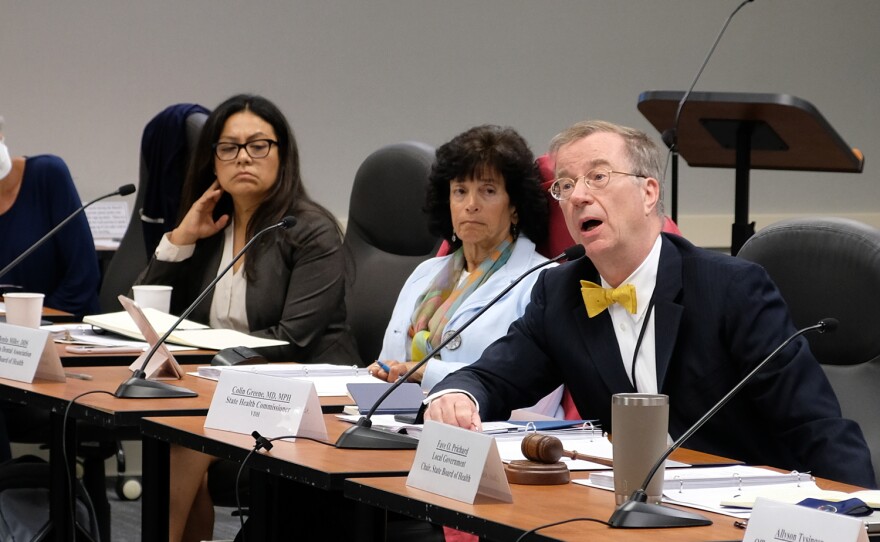Virginia’s Board of Health voted to formally reprimand Dr. Colin Greene, commissioner of the Virginia Department of Health, on Thursday in Richmond.
The move comes after The Washington Post reported last week that Greene played down the significance of racism in affecting health outcomes during interactions with state health officials and interviews with press.
“I would propose a resolution that perhaps could serve as a guide,” said board member James H. Edmondson. He read a resolution acknowledging the history of racial disparity in health outcomes and noted the research backing up the assertion that systemic and individual racism contribute to those disparities. The resolution also officially declared that Greene’s comments in the Post embarrassed the board and its members.
Greene later walked some of those comments back, and he spent much of the early portion of the Thursday meeting asserting that the Post misrepresented what he'd said.
“While some of the statements that you made this morning clarify and perhaps modify somewhat the impressions that have been created in the press recently, I certainly am not entirely satisfied,” Edmondson said.
The board has no actual supervisory power over Greene and therefore cannot compel him to step down. Gov. Glenn Youngkin, who appointed Greene in April, weighed in on the controversy earlier this week, telling reporters in Glen Allen that he hadn’t made any decisions on Greene’s future.
The board's resolution was adopted with no opposition from members.
Greene attempted to provide context to his claim that the term “racism” was likely to alienate white Virginians, saying it came from a discussion on messaging.
“What I want to do is to avoid using language from the outset that’s going to alienate a large chunk of the audience,” he said. “I want to avoid being divisive.”
This echoes Gov. Glenn Youngkin’s use of the phrase “ divisive concepts” when targeting the teaching of certain subjects in public schools, particularly around the historic and present-day impacts of racism.
Board member Holly Puritz, an OB-GYN, said Greene should not avoid talking about racism’s impacts due to people's discomfort.
“You are not blaming any individual person,” by invoking racism, Puritz said. “And you should perhaps be educating people who are turned off by that comment.”
Puritz said even if Greene didn’t mean to discount racism’s impact on health outcomes, he should have publicly walked his comments back more quickly.
“Words matter, perception matters, and headlines are often all that people see,” Puritz said.
“Ma’am, you’re hearing words from my mouth [in this meeting], as opposed to what was reported,” Greene told Puritz.
Greene said that he believes race is one important factor of many, but he reiterated that he believes structural racism is difficult to use as a marker of health because “it’s not an objectively quantifiable variable. That’s why I like to look at things that can be measured that are parts of structural racism.”
Patricia Kinser, a board member and assistant dean for research at VCU Nursing, pushed back on that, saying there are ways of measuring systemic racism and discrimination. There is a growing field of research on the subject.
Greene said in the meeting that he’s directing VDH to not “echo proclamations of crisis” — an apparent reference to the state declaration he downplayed — but to instead focus on what he calls “root causes.”
“I would rather put emphasis on specific effects, such as maternal disparities, death disparities, infant death disparities,” Greene said. “I’d like to talk about social determinants of health, which are certainly part of the structural racism problem, but I’d like to talk about them individually.”
Greene said maternal mortality is a significant issue for his agency and the governor. Nationwide, Black women are two to three times more likely to die from pregnancy-related causes than white women.
Puritz argued it is vital for Greene, as a leader in the commonwealth, to recognize the actual impacts of racism and other public health threats in the state.
Greene promised to include documentation on the impacts of race on maternal mortality and ensured that it would remain central to VDH discussions of the issue.
“I’ve made it very clear that this is a major issue, and I’m not interested in suppressing anything that might be helpful,” Greene said. Greene’s taking the same “root cause” angle with his professional approach to gun violence.
He did not repeat his assertion that “gun violence” is a Democratic talking point — but he chose not to walk that back when asked about the statement by a board member, either. He argued that different types of gun violence — suicides, homicides and mass murders — have different root causes and require different solutions.
“Violence comes from, in most cases, inside a human being.” Greene said. “The use of firearms is a part of that, but it’s not the full picture.”
Research suggests that access to guns does increase the likelihood of gun violence — including suicides and homicides.



